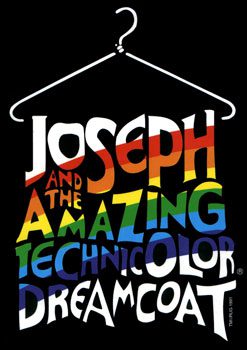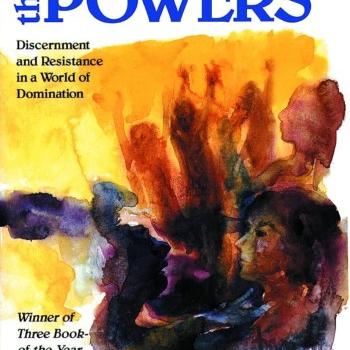This is a post from my old TypePad site that got lost in the shuffle when we converted this blog to WordPress in the move to Patheos back in 2011. I just came across a copy of it in an old Word document, so I’m reposting it here.
The book of Genesis, as its name suggests, is a collection of origin stories. It’s not a history book. Most of it isn’t even set in history, but in prehistory – a setting that allows for an exploration not of how the world began, but of what it means and how we are to live in it.
Origin stories are an odd genre. They’re not usually mainly about their nominal topics. A story that seems to present itself as being about why different peoples speak different languages turns out, actually, to be about hubris and the human condition. A story that presents itself as being about where rainbows come from turns out actually to be about consequences, responsibility and stewardship.
If you’re unfamiliar with origin stories, or if you’re tempted to misunderstand them by reading them as histories, then it might be good to revisit Rudyard Kipling’s Just So Stories. Kipling’s adaptations and inventions of folkloric origin stories are excellent examples of the elliptically didactic function of such stories. The stories are lessons, but the lessons aren’t usually about the purported subjects of those stories. When Kipling wrote of “How the Camel Got His Hump,” he was really writing about something else. Not cause, but meaning and ethics. It’s not a story about adaptation or genetics, but rather a story that enlists the camel as a symbol to remind readers/listeners about fairness and responsibility.
Much of Genesis works the same way. The story of Noah, for instance, isn’t a clumsy guess about the origin of rainbows by some neolithic ignoramus who didn’t understand about refracted light. It is, rather, a didactic story that enlists the rainbow as a memorable symbol to reinforce its lesson. Whenever you see a rainbow, the story says, remember this.
After the collection of very short, very abstract stories in its first 11 chapters, Genesis shifts tone a bit with the introduction of Abram. Here the stories become a bit more grounded in history than in prehistory, but they are still Genesis stories – still origin stories.

To me, the oddest of all of these Genesis stories – and that’s saying quite a bit – is the one involving the 11th of Abraham’s great-grandsons, Joseph. This is a famous story, well-known from children’s books and even Broadway, but get past the familiarity and you’ll find something strange and disturbing. If this were a Just So story, it might be titled something like “How Egypt Got Its Tyrant.”
The story of Joseph is, in part, the origin story of Pharaoh as absolute ruler and oppressor. I think that Pharaoh in this story is probably serving as a symbol – playing the role of Kipling’s camel or of the legless serpent, the rainbow or languages in earlier stories from Genesis. It is often the case in origin stories that the purported explanation suggests that things aren’t the way they ought to be. The biblical Just So story of “How the Serpent Lost Its Legs” underscores its lesson by suggesting that snakes weren’t really supposed to be slithering about. That the world isn’t the way it’s supposed to be is, of course, central to the lesson of that story – and whenever you see a snake, remember this. The same goes for the “Babel” of languages in that later story and it’s probably also true of this story of how Pharaoh came to be the absolute leader of an enslaved people. Pharaoh’s tyranny here is just a given, an unfortunate reality that can serve as a memorable symbol for the lessons of this didactic story about providence in time of need.
That makes this story a bit less disturbing, but it’s still pretty awful.
Here is the part of this story I mean, from Genesis 47, describing how Pharaoh – with Joseph’s vital help – exploits a massive famine to turn his people into landless serfs and debt-slaves:
Now there was no food in all the land, for the famine was very severe. The land of Egypt and the land of Canaan languished because of the famine. Joseph collected all the money to be found in the land of Egypt and in the land of Canaan, in exchange for the grain that they bought; and Joseph brought the money into Pharaoh’s house.
When the money from the land of Egypt and from the land of Canaan was spent, all the Egyptians came to Joseph, and said, “Give us food! Why should we die before your eyes? For our money is gone.”
And Joseph answered, “Give me your livestock, and I will give you food in exchange for your livestock, if your money is gone.” So they brought their livestock to Joseph; and Joseph gave them food in exchange for the horses, the flocks, the herds, and the donkeys. That year he supplied them with food in exchange for all their livestock.
When that year was ended, they came to him the following year, and said to him, “We cannot hide from my lord that our money is all spent; and the herds of cattle are my lord’s. There is nothing left in the sight of my lord but our bodies and our lands. Shall we die before your eyes, both we and our land? Buy us and our land in exchange for food. We with our land will become slaves to Pharaoh; just give us seed, so that we may live and not die, and that the land may not become desolate.”
So Joseph bought all the land of Egypt for Pharaoh. All the Egyptians sold their fields, because the famine was severe upon them; and the land became Pharaoh’s. As for the people, he made slaves of them from one end of Egypt to the other. … So Joseph made it a statute concerning the land of Egypt, and it stands to this day.
That’s a tale of reprehensible exploitation, oppression and enslavement. It betrays that “something in the soul that cries out for freedom” of which Martin Luther King Jr. spoke, echoing the prophets of the same scriptures that tell us the story of Joseph.
Perhaps it’s not surprising that a modern, Western reader would recoil from Joseph’s behavior in this story, but it isn’t simply my own 21st-century, democratic sensibility that is put off by this. The authors and compilers of the rest of the Pentateuch also share my discomfort with this story. Joseph and Pharaoh, the story says, conspired to amass wealth and consolidate power by preying on the hungry. That behavior is condemned and forbidden by each of the other four books of Moses – a prohibition that is frequently grounded in the reminder that “you were once slaves in Egypt.”
The book of Exodus, in particular, isn’t satisfied with the ending of Joseph’s Just So story. It begins with a different tyrant on Egypt’s throne, but Pharaoh is still Pharaoh, and Exodus wastes little time going after him with fury and ferocity. One plague is deemed insufficient for this oppressor – he gets hit with 10 of them, and then, for good measure, he and his army are swallowed by the sea.
Somewhat more recently, the 16th-century theologian John Calvin also found this Just So story of Joseph and Pharaoh difficult and distressing. Calvin thought this story was something to be contended with. His commentary on Genesis 47 flails about when it gets to this story, trying on various arguments to “defend Joseph” from what appears to be “the height of cruel and inexplicable avarice” and a “miserable spectacle” in which Joseph “abused their penury.”
Ultimately, not wholly satisfied with any of these defenses or even with their cumulative effect, Calvin settles on simply warning his readers not to follow Joseph’s example:
Let those who are too intent on wealth beware lest they should falsely employ Joseph’s example as a pretext: because it is certain that all contracts which are not formed according to the rule of charity are vicious in the sight of God; and that we ought, according to that equity which is inwardly dictated to us by a secret instinct of nature, so to act towards others as we wish to be dealt with ourselves.
The Golden Rule, Calvin says, must be our guide. It must be the lens through which we view everything else, the rule by which we evaluate everything else because, as Jesus said, “this is the law and the prophets.”
That approach, broadly, is the same one taken by Rabbi Rachel Kahn-Troster, who wrote about this story of Joseph and Pharaoh for the American Jewish World Service. I’ve browsed through dozens of commentaries and articles discussing this story and Rabbi Kahn-Troster’s is the one I found most helpful. She discusses the moral implications of Joseph’s atrocious behavior, quoting Leon Kass:
Israel is … cursed by Joseph’s policies. … Joseph’s consolidation of Pharaoh’s power will result in the practice of wholesale slavery. Thanks to Joseph’s agrarian policies, Egypt is transformed into a nation of slaves and Pharaoh becomes Egypt’s absolute master.
But “despite our own moral indignation” at this story, Kahn-Troster notes, “the Torah does not condemn Joseph for his actions.” At least not within this story itself. Those same actions are certainly condemned elsewhere in the Torah, however, and Kahn-Troster does not hesitate to apply those condemnations to Joseph. The long-term impact of his actions, she notes, “extends a system of indebtedness and servitude to future generations” and thus, she writes with great understatement, “Joseph’s moral choices leave a lot to be desired.”
Kahn-Troster goes on to discuss the systems of indebtedness and servitude that plague our world still, and to discuss our individual and corporate responsibility to oppose them. If I were assigned the task of preaching on this text from Genesis 47, I think I would take Kahn-Troster’s article as my model.
In responding to this troublesome story, both the rabbi and the reformer provide examples of how to approach conflicts in scripture. I grew up in an American evangelical tradition that wasn’t well-equipped to deal with such conflicts. Our primary means of dealing with them was not to. We would simply pretend no such conflicts existed in the text. We would pretend that this diverse, messy anthology of stories, songs, sermons and screeds nowhere contained opposing points of view.
One effect of such denial was that we wound up with whole territories of scripture we avoided so as to minimize our exposure to the undeniable conflicts that exist in the Bible.
But the larger, more pernicious effect was that we denied ourselves the resource employed above by Calvin and Kahn-Troster – we rendered ourselves unable to evaluate the conflicting voices, unable to know which side of the arguments to side with. Should we celebrate Pharaoh’s consolidation of power and his enslavement of the people? Or should we celebrate his overthrow and their liberation?
Because we were pretending that there could never be any need for any overarching rule we tried to get by without one – reading our Bibles without the focusing lens of the “rule of charity” Calvin cited, without the governing principle of the Golden Rule.
That’s a haphazard and hazardous approach. Take that approach to the Bible and you’re likely to wind up using it to support systems of indebtedness and servitude, abusing the scriptures to justify your position at the right hand of Pharaoh.
















